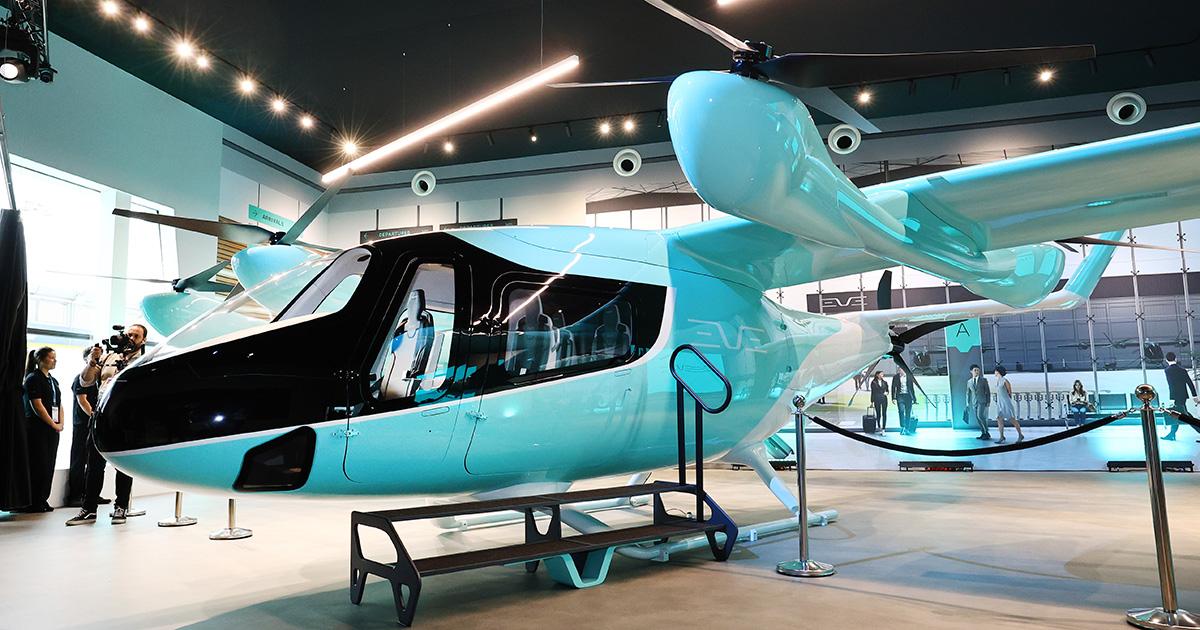|
Getting your Trinity Audio player ready...
|
The first deal of the 2025 Paris Air Show was sealed on Sunday, when Brazil’s Revo signed a binding contract that will see it operate air taxi services in São Paulo with 50 Eve Air Mobility four-passenger eVTOL aircraft. The spinoff from helicopter group Omni intends to take delivery of the first 10 vehicles in late 2027, with the others to follow as it scales up the operation.
These sales are set to be the first of more than 1,000 commercial aircraft orders anticipated at Le Bourget this week. According to analysts at investment group Jefferies, carriers including IndiGo, Riyadh Air, Cathay Pacific, LOT Polish Airlines, and Turkish Airlines are expected to account for the lion’s share of these. However, there is now doubt about whether Air India will complete orders for around 200 narrowbodies and 40 widebodies as it deals with the consequences of Thursday’s fatal accident involving one of the airline’s Boeing 787s in Ahmedabad (see page 4).
At an event on Sunday morning, Eve CEO Johann Bordais introduced several design changes to the Eve aircraft, unveiling a mockup at the company’s chalet. These include four-blade propellers with fewer parts and lower drag and noise, lighter cabin seats developed by Recaro, a new cockpit design with a four-axis sidestick control jointly developed with Garmin and Crouzet, and an option to have wheeled landing gear in place of skids.
Revo CEO João Welsh told reporters his team has been working for the past five years to determine how to establish air taxi services in a city that already makes extensive use of helicopters. He said eVTOLs are set to reduce two-hour commutes by car to just 20 minutes, connecting business and residential areas as well as airports.
The Embraer subsidiary, which now claims to have logged provisional sales agreements valued at $14 billion, believes that by 2045 there will be 30,000 eVTOL aircraft in commercial service. It has published a global market outlook on Sunday projecting that three billion passengers will use air taxis over the next 20 years, generating $280 billion in revenues.
Eve’s analysis of the nascent urban air mobility market is based on data for 1,800 cities from the United Nations’ World Urbanization Prospects platform, as well as information about 1,000 airports and 27,000 civil helicopters in operation today. By 2035, more than 800 cities will have a population of more than one million, accounting for some 2.5 billion people.
“For the past four years, we haven’t only been focused on product development—we’ve also been building the business case with our customers,” Bordais told AIN. “The use case for our vehicle is up to 150 kilometers, and what we have seen is that 80% [of commercial flights] would be urban point-to-point, as well as medical services. It’s first-mile, last-mile, and airport shuttles.”
Trial Operations in Cities
Eve has conducted trial operations in partnership with helicopter operators to prepare a concept of operations for eVTOL air taxis in cities including Rio de Janeiro and Chicago. “There are 780 helicopters in São Paulo and 170 helipads, and most of these will be able to be used by eVTOLs,” Bordais explained.
According to Eve’s analysis, North America and the Middle East will be the main early adopters of urban air mobility services. It believes Europe will follow more slowly due to regulatory challenges, and that demand in Africa could be driven by the need to overcome infrastructure limitations.
Last week, Eve announced plans to offer product support for eVTOL operators through its TechCare program. The company’s integrated services division also offers an air traffic management solution called Vector.


